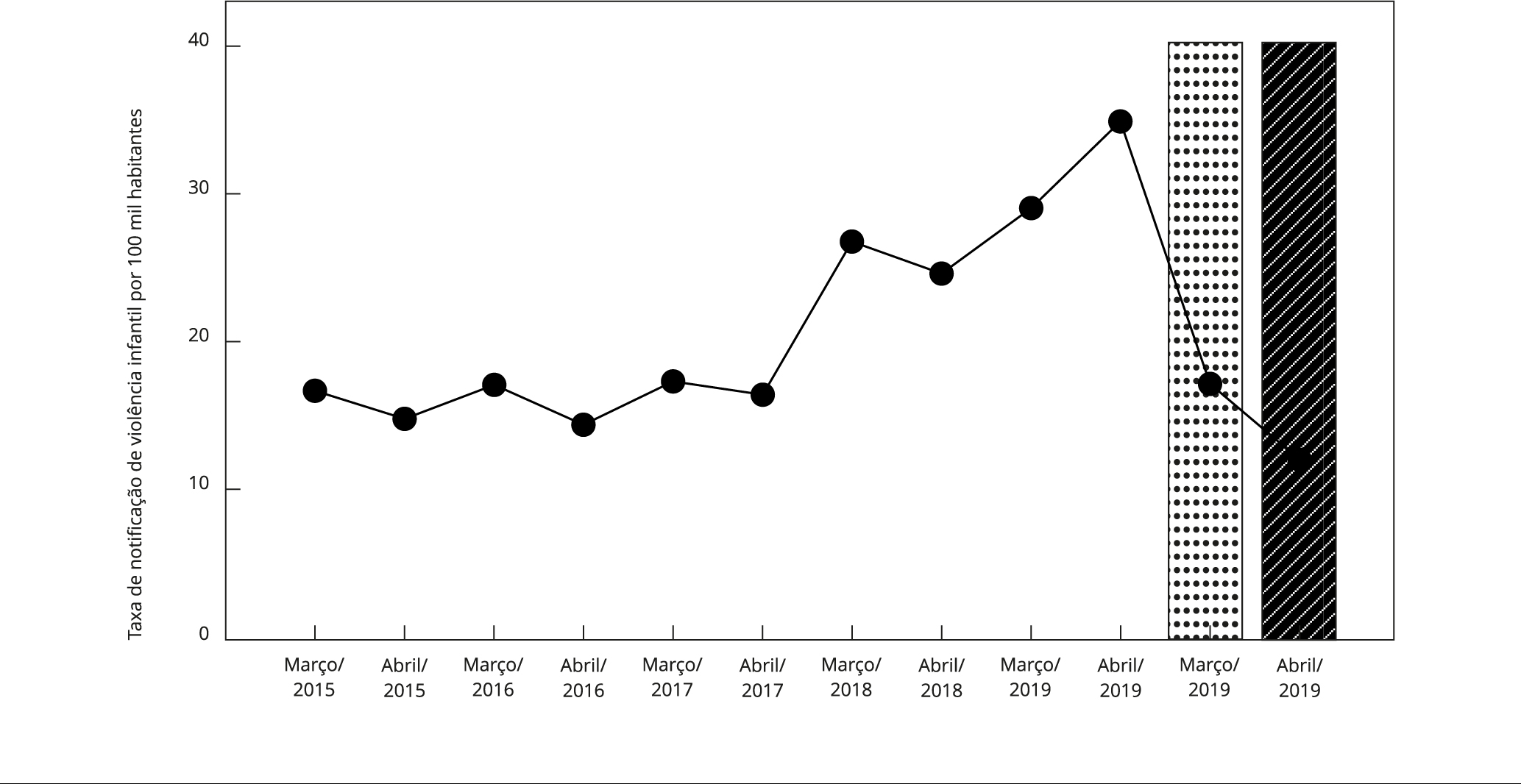This study aimed to analyze the rates of reports of violence against children and adolescents in the state of Rio Grande do Sul, Brazil, from 2015 to 2020, and the changes in trends by period due to the novel coronavirus pandemic (COVID-19). This is an ecological time series study with secondary data obtained from the Bi Saúde Portal in the panel on Interpersonal Violence and Suicide. The study collected reports on violence in individuals 0 to 19 years of age in the months of March and April each year, stratified by sex, age bracket, race/color, and type of violence. Prais-Winsten regression was used to analyze the time trend. Of the 7,718 reports analyzed, there was a drop of 54% in the year 2020 compared to the same period in 2019. The analysis of the trend until 2019 indicated an increase in the reporting rates (2.04, 95%CI: 1.01; 3.07, p = 0.002), but with the inclusion of the year 2020 in the time series, the direction of the trends in reporting rates was reversed to negative, losing statistical significance (-0.39, 95%CI: -1.16; 2.14, p = 0.632). The study concludes that social distancing due to the pandemic reduced the reporting rates of violence against children and adolescents due to underreporting, thus requiring strategies to improve the identification of suspected cases of violence during the pandemic. This highlights the need for inter-sector planning and rapid and specific actions (health, social protection, justice, and public security) in order to guarantee the rights of children and adolescents.
Keywords:
COVID-19; Social Isolation; Child Abuse; Domestic Violence; Pandemics

 Thumbnail
Thumbnail
 Thumbnail
Thumbnail
 (A) Selecionado o Estado do Rio Grande do Sul; (B) dados do Sistema de Informação de Agravos de Notificação (SINAN) foram acessados no Portal Bi Saúde (http://bipublico.saude.rs.gov.br/index.htm) no painel Violência Interpessoal/Suicídio; (C) dois pesquisadores de maneira independente coletaram os dados de violência infantil por faixa etária, sexo, raça/cor e tipo de violência; (D) nos períodos de março e abril de 2015-2020; (E) para posteriores análises estatísticas.
(A) Selecionado o Estado do Rio Grande do Sul; (B) dados do Sistema de Informação de Agravos de Notificação (SINAN) foram acessados no Portal Bi Saúde (http://bipublico.saude.rs.gov.br/index.htm) no painel Violência Interpessoal/Suicídio; (C) dois pesquisadores de maneira independente coletaram os dados de violência infantil por faixa etária, sexo, raça/cor e tipo de violência; (D) nos períodos de março e abril de 2015-2020; (E) para posteriores análises estatísticas.
 Nota: é demonstrada a taxa do total de notificações de violência infantil por 100 mil habitantes, com destaque para os meses relacionados ao distanciamento social devido ao novo coronavírus. Coluna com pontilhados indica que 38% do mês em regime de distanciamento social e suspensão de aulas. Coluna com listras indica que 100% do mês em regime de distanciamento social e suspensão de aulas.
Nota: é demonstrada a taxa do total de notificações de violência infantil por 100 mil habitantes, com destaque para os meses relacionados ao distanciamento social devido ao novo coronavírus. Coluna com pontilhados indica que 38% do mês em regime de distanciamento social e suspensão de aulas. Coluna com listras indica que 100% do mês em regime de distanciamento social e suspensão de aulas.